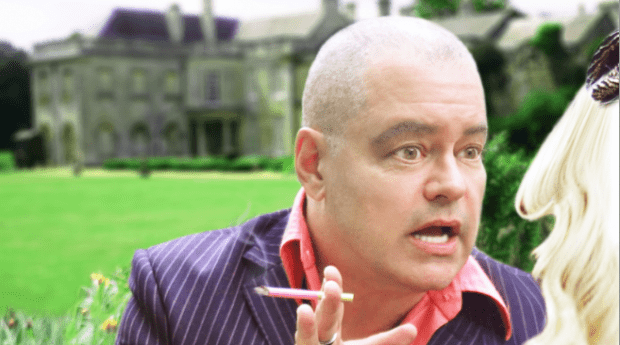Oftentimes in Canada, we are reticent to lionize or indeed — do we dare? — canonize our own talent. If one were to appoint oneself the task, occupying the all-important margins of such a canon of Canadian Arts and Letters would certainly have to be Sky Gilbert.
In his new book, Compulsive Acts: Essays, Interviews, Reflections on the Works of Sky Gilbert, editor David Bateman curates a diverse cross-section of some of the artists and thinkers who have found themselves in Gilbert’s orbit throughout his career. One of the keys to the success of Bateman’s collection is his pluralizing — Compulsive Acts truly engages with the works of Gilbert as a playwright, filmmaker and radical and contextualizes his decades of cultural production within a social, cultural, sexual and political framework.
The essays in the collection range from the personal — Gilbert’s partner, Ian Jarvis, speaking about day-to-day life with the multi-hyphenate artist and the play that Gilbert based on their relationship — to ruminations from frequent collaborators such as Keith Cole and Moynan King. The fact that many of Gilbert’s longtime artistic playmates also have the academic and intellectual heft to engage with his work on a variety of levels is another strength; both Cole and King compose fascinating short pieces that balance the academic with the artistic, and former Buddies in Bad Times artistic director Sarah Garton Stanley offers a moving essay inspired in part by queer academic Judith (Jack) Halberstam’s The Queer Art of Failure. Also included are interviews with the likes of Gilbert muse Ellen-Ray Hennessy and DNA Theatre founder Hillar Liitoja, reviews of two of Gilbert’s plays by Bateman, as well as the full text of Gilbert’s recent autobiographical play To Myself at 28. Framing the entire book is a long and accessibly rendered essay by academic and former Buddies board president Paul Halferty, which functions as a sociopolitical survey of queer politics in Toronto using the production of Gilbert’s landmark play Drag Queens on Trial as a centre point.
Xtra speaks to editor David Bateman — a multi-hyphenate artist/performer in his own right — about the process of putting together Compulsive Acts.
Xtra: Can you speak about your process for soliciting and curating the pieces that are included in the book?
David Bateman: I wanted a sense of a strong queer community of people who have done work with him, and at Buddies in general. So I initially contacted people I knew from his productions, and then I contacted a few people who could give the collection a bit of academic and historical context, in order to culturally, and socially, position and lightly theorize some of his work.
Paul Halferty’s essay on Drag Queens on Trial creates a frame for the book. Did you intend to build the book around a historical essay?
I did want a sociocultural perspective but wasn’t sure exactly where that would come from. So, no, it wasn’t an entirely conscious choice, but as soon as I got the essay from Paul, I knew it would be a great introduction to the whole environment that Sky has worked in over the years, politically and historically. And the other essays somehow raised many issues from Paul’s essay — and each other’s — without making conscious connections.
It’s a great strength of the collection that the pieces are each so personal. Was this an editorial directive that came from you or just a happy accident?
A bit of both. It was partly an editorial device. I gave all the writers free rein with the topics and made suggestions here and there. I asked them to write about a play of Sky’s they had been involved in, from a personal or professional perspective. I was very happy when Sky suggested Ian Jarvis, because I knew Ian would give whatever he wrote a very personal and intelligent perspective, and of course, he did, and it reflects Sky’s very open and very sex-positive approach in his plays and in his life. And who better to write about this than Ian, Sky’s partner of many years?
Oct 30, 2014, marks the ceremonial unveiling of Sky Gilbert Lane in the alleyway behind Buddies, so the topic of legacy is in the air. If you had to try to encapsulate what Sky’s major importance as an artist/thinker/activist has been — and continues to be — or put his legacy into words, what would they be?
Sky’s importance/legacy can be located in so many places. He has nurtured younger artists, and peers working at the same time as him, and continues to give other artists the opportunity to work in theatre. He gave me my first opportunities in queer theatre in Toronto. And he has never separated his queer art from his queer life. As a theatre practitioner, and now an educator, he has given more than one generation of queer artists, students and queer individuals in general a huge body of work to relate to and respond to. The naming of a kind of back alley in his honour is perfect! Sky has brought “back alley” politics out of the closet and put them onstage for everyone to see. I just hope that the powers that be have the good sense to also name a variety of gutters, potholes, sewer covers, et cetera after all the other amazing queer artists that have made their queer way through the fabulous dark crevasses, laneways and back alleys of the past several decades.
Compulsive Acts: Essays, Interviews, Reflections on the Works of Sky Gilbert is available at Glad Day Bookshop, 598 Yonge St and online.

 Why you can trust Xtra
Why you can trust Xtra


